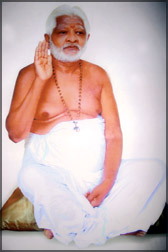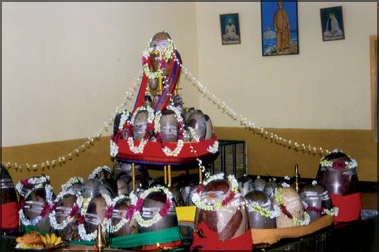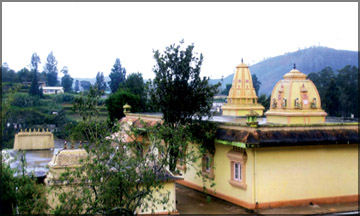|
HINDUISM
Gayathiri Sidhar’s first anniversary
Text and pictures by P. Rajaratnam in Nuwara Eliya
 |
|
Gayathiri
Sidhar Murugesu Swami |
The 1st anniversary of Jeewa Samadhi and Kumbabisheka Ceremony of
late Gayathiri Sidhar Murugesu Swami was held on October 10 at the Sri
Gayathiri Peedam in Nuwara Eliya and the Poojas with the pooja starting
on October 8.
His devotees came from different countries including India, Malaysia
and South Africa and according to the organisers thousands from
different parts within the country also attended this Poojas.
The late Swamiji Dr. R. K. Murugesu was the chief incumbent and
founder of the Gayathiri Peedam and the Lankatheeswarar temple here,
which is being chiefly patronised and attended by thousands of devotees
belonging to different communities within the country and aborad - the
main Poojas are being an annual event on all Poya days here.
 |
|
The 37
Lingams at the temple. |
Swami late Murugesu over four decades took great pains towards
establishing this Peedam and the temple and today it has spread over the
country including the Eastern province and abroad. The late Swamiji’s
main objective was to promote peace and concord among the different
communities and ensure that they all lived with peace and dignity among
themselves.
It was in 1974 that the Sri Gayathiri Peedam and the Lankatheeswarar
Temple was established in Nuwara Eliya with the Shiva Lingam installed
in this temple which was found in the rivers of Narmada of India under
the directions of a great Sage Sri Gayathiri Devi in the year of 1986.
The Sri Lankatheeswarar Temple and the Sri Gayathiri Peedam is now
internationally recognised and hundreds of foreign devotees visit here
frequently.
Today the temple and the Peedam has several facilities with a huge
Hall to accommodate nearly a thousand devotees in addition to
accommodation facilities of devotees who come from outstations.
 |
|
The
Gayathiri Temple, Nuwara Eliya |
Every Poya day the poor are being fed.
The late Murugesu Swamiji has written a number of books on spiritual
teachings and other allied religious subjects both in English and Tamil
and in addition periodical lectures and Yoga Exercises are being
conducted by eminent persons from India and other countries who visit
this temple and the Peedam for the benefit of the devotees and others.
The other most significant feature of the temple here is that there
are 37 Lingams brought from famous historical places in India and are
kept here for the veneration of the devotees who flock here.
In addition the Swamiji’s Statue is enshrined in the main hall within
the temple premises for his numerous devotees to pay tribute to him.
According to one of the Swamiji’s disciple and devotee K. Mohan, who
manages the affairs of this temple says that there is a miracle among
the devotees of this temple, who often believe that the late Swamiji
still lives in their mind and continue receiving his blessings.
Understanding Hinduism – 7:
The Language of Religion
K.S. SIVAKUMARAN
Strangely the language is a barrier or obstacle for direct
communication as far as religion is concerned.
Conversely for effective communication precise usage of language is
essential, you would agree. Again silence is also a language. And in
good cinema in most places there is silence than verbal harangue as in
the so-called serial dramas aired over Thamilnadu TV Channels; and
ironically imported by the local Thamil channels.
Let’s look at these stupid and so-called “serial dramas” on the small
screen in Lanka erroneously called Teledramas, some other time.
Reverting to the main topic, we find that the inadequacy of language
to convey our subjective experiences perplexes us. Won’t you agree? Even
great communicators in various fields have found that at times they are
struck by the inadequacy of the language.
Let’s illustrate: May I venture to say that the core of Christianity
is the Divinity of Christ.
Let us leave aside for a moment the mass of evidence collected in and
outside the Bible to support this claim.
We learn that Christ himself had asserted that He and the Father are
One.
This is not astounding to a Hindu as the Vedic statement “Thou Art
That” reminds him of that reality. That understanding is the core
summing up of the Vedas.
We also learn that the Buddha remained silent when somebody had asked
him whether there was a God or a Soul. The Buddha would have felt that
the question was foolish because he had transcended all limitations and
ideas like God, Soul, and the like which are relative terms in Time,
Space and Causation.
If he were to explain truthfully to the questioner, the latter would
have undergone a state of confused mind. Therefore the Buddha kept
silent and allowed the questioner to undergo a ‘felt experience’.
To the Hindu Vedantist this silence speaks volumes particularly to
the Athuviddhists.
They also believe that silence is the crowning expression of Nir
Vikatpa Samadhi or the realisation of Nir Guna Bramam.
Even within one religion there are different sects. This is because
different people see different things even in a particular object.
Unless we could empty our minds of all preconceived ideas it is
difficult for two people to see anything alike.
As we know any object is the reflection of that object plus our
conditioned thinking. Unless we have an open mind it is very difficult
to understand anything in perspective.
But we are all passionate on many matters. That is why sometimes it
is better to be silent when people refuse to be ‘empathetic’ to see and
understand another person” point of view.
Let’s go back to Thamil Religious literature. Thirumoolaer of so many
centuries ago said that the bliss experienced in Nir Vikatpa Samadhi is
inexpressible. He explained: the sexual pleasure a mother had with her
husband could not be conveyed to her little daughter who had not
attained an age of maturity. Thaayumaanavar (17th C) had the same
opinion.
He said that fragrance cannot emanate from a tender bud and that we
have to wait until it blossoms into a flower.
Sweet juice can be found only from a ripe fruit and from a green one.
All this goes to prove that the highest religious bliss could be
experienced or imagined only by realised beings.
Hindu Saints and The Bakthicult -5:
Lady Saint Karaikkal Ammayar
T.V. Vijayaratnam
“Woman is nothing if she is not self-sacrifice and purity
personified” are the words of no less a person than Mahatma Gandhi. From
time to time we hear of such personifications of Indian womanhood in the
annuals of Indian History.
One such lady saint who was the embodiment of self-sacrifice and
purity was the famous lady saint of Karaikkal called Mother even by Lord
Siva - ‘Ammaye’ He addressed her - she was a canonised saint of the
fifth century A.D.
This famous saint was born as Punithavathy in a distinguished
merchant family of Karaikkal which was then a French enclave on the east
coast of Thamil Nadu, in the Tanjavur district.
From her childhood itself like Mother Mira of Pondicheri, like Aandal
another girl saint of the Vaishnava Clan, and like Meera another devotee
of Lord Krishna, Punithavathy too was of a religious temperament. She
developed a great devotion to men of God. As she came of age a marriage
was fixed for her with a rich young merchant called Paramadattan.
They led a quiet domestic life. She fed visiting Siva devotees, and
gave them money and clothing as was wont at that time. Life went on
smoothly for the young couple.
One day when Paramadattan was out on business, he was presented with
two delicious mangoes by one of his clients. Paramadattan sent the
mangoes to his wife. That day a mendicant came there for food.
She welcomed him and prepared to feed him. The rice was cooked but
the side dishes were not ready. So she served him rice and gave away one
of the mangoes in place of a side dish. The mendicant ate it happily and
departed after blessing her.
Later in the day Paramadattan came home to take his lunch. She served
him the second mango. Finding the mango so tasty he asked for the other
mango.
As Punithavathy was a meek and timid woman she didn’t know what to
do. She went into the larder. Just a twist of fate made her forget to
tell him that she gave it to a mendicant. Instead, she prayed to God, “O
Lord what shall I do? Please help.” And Lo: and behold: a mango appeared
miraculously on her uplifted hands. She happily served this to her
husband.
He ate it. felt it more delicious than the other. He questioned her
and elicited the truth from her. He couldn’t naturally believe what she
said. He told her to get another mango from God - the way she got the
earlier one. She prayed and by will of God she got another mango. She
gave it to Paramadattan who took it with great wonder. The minute it
changed hands the mango vanished.
Paramadattan was awestruck. Here was a woman who had some divine
power she was no ordinary woman. He could not live with her nor treat
her like any ordinary woman. She was a celestial being far above him -
one who should be worshipped and not lived with. However he kept mum
about it. He told no one about it.
After a few days he went out to sea on business and went out of her
life for good. After a successful business trip and after earning enough
wealth, he landed in a town in the Pandiya country unknown to his
people. There he married and settled down and in due course a daughter
was born to him. He named her Punithavathi after his first wife at
karaikkal.
Way back at Karaikkal Punithavathy was living in Karaikkal waiting
for her husband. Somehow news came to her people that Paramadattan was
living as a wealthy affluent merchant in Pandinad.
Her people took her in a palanquin to his new residence. He met her
with his second wife and child and prostrated himself before her saying,
“By your grace I am doing well. This is my child who bears your name.”
Punithavathy was horrified at what he did.
Her people asked him how he could worship his own wife. Paramadattan
answered calmly. “She is no ordinary woman. She is a celestial being
from heaven whom you too should worship.”
Punithavathy knew for certains’ there was no chance of a reunion. She
maintained her looks and youthful personality for her husband’s sake.
Now that the husband himself had left her. She had no use for youth and
beauty. She prayed to God to take away her physical form and give her
the form of a ghost. Immediately she lost flesh and blood and became a
skeleton.
In this form she sang a poem of 100 venpa verses on Lord Siva known
as Atputha Tiruantadi - the miraculous antadi which tells of her ghost
form worshipping him. She also sang another poem of 20 verses named, the
Irattar Mani Malai (the garland of twin gems).
In this skeletal form she, in a religious fervour and frenzy, she
went to Mt. Kailas the holy abode of Lord Siva to have a vision of the
God. As she climbed up the steps Umadevi, consort of Lord Siva
exclaimed. “Lord, here is a ghost like form coming up. What love and
devotion my Lord.” Lord Siva replied, “This is the Mother who sings our
glory. She prayed for this form and got it. Lord Siva greeted her
saying, “Welcome Mother.” She fell at His feet and sang,
“Lord I desire no
more births,
If I am to be born
Let me never forget
Thee
My desire is to
witness Thy dance,
Seated at Thy feet”
Lord Siva promised her eternal rest at Tiru-Alankadu, a shrine near
Chennai. There she stayed and prayed until she attained Moksha.
This lady Saint thereafter was known as “Karaikkal Ammayar.”
Her lyrics are soulful outpourings of a joyous being which had a
blissful experience of divine manifestation. She is a fore-runner of a
new cult of the Tamils. Her thoughts are to a good extent responsible
for the evaluation of the Saiva Siddhanta Philosophy from that century
onwards.
As a final note, a word should be said about a recent research on the
songs (Pann) of Karaikkal Ammayar. Professor Gnana Kulendran, an erudite
scholar and member of the Tanjore Fine Arts research team did some
intent research on the compositions of Karaikkal Ammayar and presented a
paper, “Karaikkal Ammayar - the mother of South Indian Classical Music
at the 8th World Tamil Research Conference in 1995.
And at that conference that went on for almost six days, only the
research finding of Professor Gnana Kulendran was approved of and it was
decided to get the Tamil Nadu Government order to accept the research
finding and Professor Gnana Kulendran was recognised for bringing out
such a research finding and her work was published.
Her laborious work on the subject was well rewarded by bringing world
renown not only to the Lady Saint Karaikkal Ammayar but also to this
clever dedicated unassuming lady Prof. Gnana Kulendran who is herself a
carnatic musician. One is honoured to be her contemporary. For it was
she who made “Peyar” - a ghost - a “Thayar” - mother.
Vaani Vizha celebration
The Hindu Association of Lake House held its annual Saraswathi Pooja
festival at the All Ceylon Hindu Congress Hall last week.
The first copy of the annual Navarathri souvenir, Jaladeem, was
handed over to the Director Editorial of ANCL, Nihal Ratnaike.
Kalabooshanam Dr. Kumarasamy Somasundaram, Retired Assistant Director
General, National Institute of Education, Maharagama was felicitated
with the presentation of the honourary ‘Jaladeem’ award. The cultural
programmes included a Bakthi Gee performance by the students of Sandya
K. Abeyawardena and Baratha Natya performance by the students of
Sivanandhi Haridharshan’s Nirthana school of dance. |

